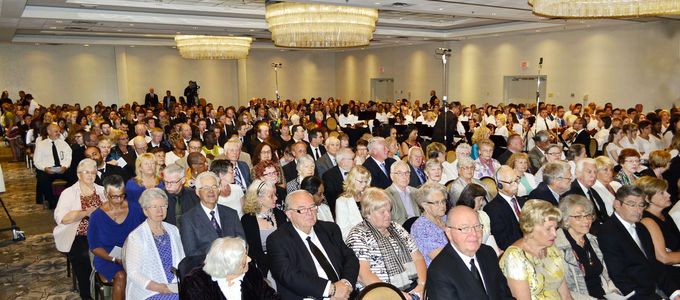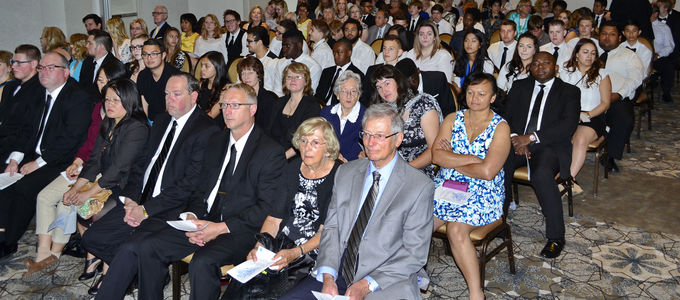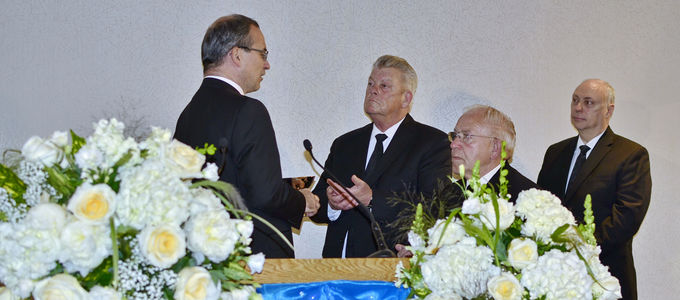
Jesus puts Himself on the same level as mankind, Christians maintain. That is why He was born. Jesus can save mankind, which is why He died. This is the clear message of the gospel. In a divine service at the beginning of July in Vancouver in Canada, the Chief Apostle underlined this old and yet very topical message in very impressive way.
Chief Apostle Jean-Luc Schneider celebrated the divine service for the departed in western Canada, in Vancouver. The Bible text he used was Psalm 34: 18: “The Lord is near to those who have a broken heart, and saves such as have a contrite spirit.” It is a word from the Old Testament, he said, but of course you immediately think of the Lord Jesus and read this old psalm in light of the gospel. “Jesus was the God who came to earth,” he said. “Jesus lived on earth and allowed mankind to experience God. Jesus was close to those who had a broken heart.” He was close to the sick and those who were close to despair because there was no hope for recovery. He was also close to those in mourning. “Just think of the widow of Nain. Her only son had died. Jesus came, saw her broken heart, and helped her.”
The Chief Apostle reminded the congregation also of the poor cripple by the pool of Bethesda, whom everybody had forgotten. He had been there for thirty years. “Nobody helped him; he had been completely forgotten by everybody.” But Jesus was near to him and saw his broken heart and helped him.
Jesus Himself suffered
The Chief Apostle said that Jesus was not only near to all these people. He actually lived with them, shared their daily lives, and experienced the same troubles and distress as they. “Jesus had a broken heart too.” The Chief Apostle mentioned three examples:
- His own family did not understand His mission.
- His neighbours, His people rejected and despised Him.
- He experienced violence, pain, injustice, and an ignominious death.
The Chief Apostle said that we cannot even begin to imagine the pain and suffering that some people are subjected to: “Many people have to suffer for years. Their life is simply awful. We don’t have the smallest idea of the hell they go through.”
The world is unjust
The Chief Apostle also addressed the injustice in the world. “The world is full of injustice.” There are the rich on the one side and the poor on the other side. There are those who have a successful career and others who stand no chance at even finding a job. Many people live in poor countries through no fault of their own. “They are as good as everybody else, but they have no chance because they were born in the wrong place.” Jesus is able to understand this: He died innocent. Jesus can deliver all these souls, whether they are still alive or have already died, the Chief Apostle said. As the Son of God, He will save them. But this is something that must be believed.
The humble trust in God
Jesus is God, this is something we must believe, the Chief Apostle said. We have to come to Him, trust Him, and follow Him—then we will be redeemed. “Humility is part of redemption. To come to Jesus and ask Him: ‘I need Your help!’ is part of it,” the Chief Apostle explained. Not the wish for late atonement and the restoration of justice makes us free, but a humble heart. “The humble will understand God, trust in His help, and walk His ways.” Jesus set the example: He entrusted His spirit into His Father’s hands.
This all sounds so easy, the Chief Apostle said, but to actually practice it is very hard. To be humble and have a contrite spirit means nothing other than accepting the things permitted by God which I in my humanity cannot understand. Humble people are also always willing to repent, because they know that they are dependent on God’s grace. Even if we had apparently done everything right in life, in the end there is only grace.
“Grace cannot be earned. We have to ask for it.”


















